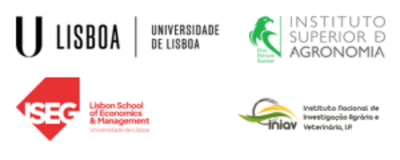The international Ph.D. program in “Agricultural Innovation in Tropical Food Chains” is jointly offered by the University of Lisbon’s "School of Agriculture (ISA, ULisboa)" and "Lisbon School of Economics & Management (ISEG, ULisboa)", in collaboration with the "National Institute for Agricultural and Veterinary Research (INIAV – State Laboratory)". A novel and innovative Ph.D. program for students from temperate countries with skills in agriculture and agri-food chains searching for tropical regions contextualization and for students from tropical countries who seek to confront their contextualized competencies with exposure to new technical and scientific knowledge, through an international training experience. A leading course providing high-quality theoretical, methodological, and contextual education in tropical agriculture and value chains to guide successful professionals, entrepreneurs, and future development leaders in transforming societies through the development of a modern, sustainable, and vital agricultural sector.
Why Choose?
Recognition of the University of Lisbon, holding the best national position in international rankings, an experienced faculty body engaged in prestigious Research Units, and high internationalization. Historical and continuous links with teaching and knowledge transfer in tropical agronomy is a strong identity mark of ISA, supporting a "project-based teaching". Possibility to attend the Ph.D. course in an intensive regime, minimizing periods abroad and travel expenses. Synergies through links with the AGRINATURA network, the Tropical Studies for Development Center (CENTROP), and the ULisboa’s Food, Farming and Forestry (F3) and Tropical (CTROP) Colleges. Synergies with international projects with tropical regions, in which the three institutions are involved, as well as joint collaborative work in the participating countries.
Vision
A leading course providing high-quality theoretical, methodological, and contextual education in tropical agriculture and value chains to guide successful professionals, entrepreneurs, and future development leaders in transforming societies through the development of a modern, sustainable, and vital agricultural sector.
Why Choose This Doctoral Program?
- Recognition of the University of Lisbon, holding the best national position in international rankings, an experienced faculty body engaged in prestigious Research Units, and high internationalization.
- Historical and continuous links with teaching and knowledge transfer in tropical agronomy is a strong identity mark of ISA, supporting a "project-based teaching".
- Participation in the Consortium of Schools of Agricultural Sciences (CECA), framed by UNESCO through the "International Center for Advanced Training in Fundamental Sciences of CPLP Researchers" provides doctoral scholarships for students from African Portuguese Speaking Countries and East Timor.
- Possibility to attend the Ph.D. course in an intensive regime, minimizing periods abroad and travel expenses.
- Synergies through links with the AGRINATURA network, the Tropical Studies for Development Center (CENTROP), and the ULisboa’s Food, Farming and Forestry (F3) and Tropical (CTROP) Colleges.
- Participation of ISA and ISEG in the European University UNITE! - University Network for Innovation, Technology, and Engineering.
- Synergies with international projects with tropical regions, in which the three institutions are involved, as well as joint collaborative work in the participating countries.

